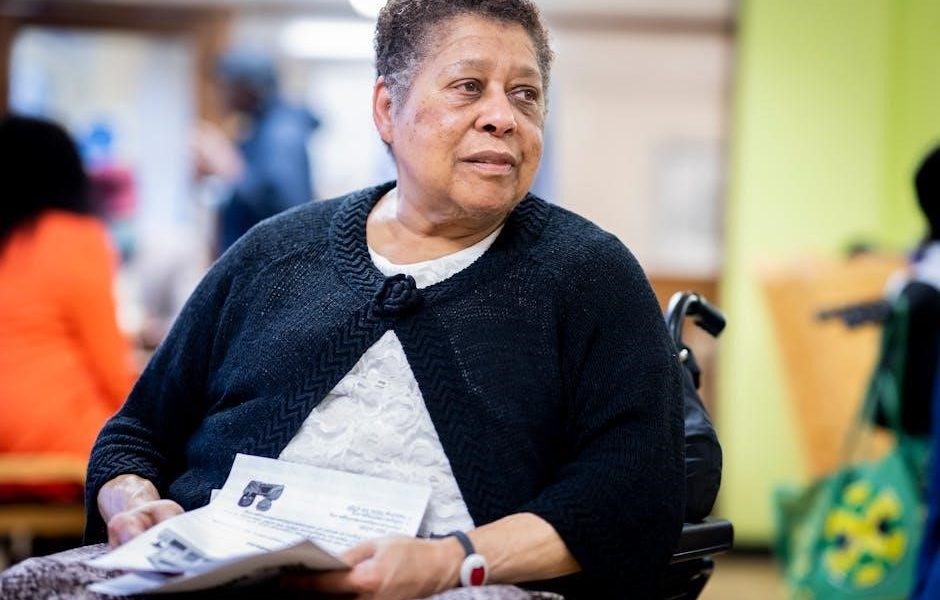The book People with Disabilities: Face to Face by Daniel J. Boudah is a call to action‚ blending personal stories‚ research‚ and resources to empower understanding and inclusion.
It goes beyond a textbook‚ offering practical insights and strategies to support individuals with disabilities‚ fostering meaningful interactions and advocating for their full integration into society.

Overview of “People with Disabilities: Face to Face”
People with Disabilities: Face to Face by Daniel J. Boudah is a comprehensive resource that combines personal narratives‚ photos‚ and essential research to foster understanding and inclusion. The book goes beyond theoretical concepts‚ offering practical strategies and real-life applications to empower individuals with disabilities. It also includes links to multimedia resources‚ such as YouTube videos‚ to enhance learning and engagement. Available in multiple editions‚ this guide is designed to help readers move beyond surface-level perceptions‚ promoting meaningful interactions and advocating for the full integration of individuals with disabilities into all aspects of society. It serves as both an educational tool and a call to action for creating a more inclusive world.
Purpose and Scope of the Book
People with Disabilities: Face to Face aims to empower readers by providing a deeper understanding of diverse disabilities and promoting inclusive practices. The book serves as a practical guide‚ offering strategies for educators‚ advocates‚ and caregivers to support individuals with disabilities effectively. Its scope extends beyond academia‚ addressing real-world challenges and fostering empathy through personal stories. By combining research‚ statistics‚ and multimedia resources‚ the book creates a holistic approach to disability advocacy‚ ensuring accessibility and applicability for a wide audience. It is available in multiple editions‚ including a second edition‚ and can be purchased or rented at various bookstores‚ making it widely accessible for those seeking to make a positive impact.

Author Background
Daniel J. Boudah is an Associate Professor at East Carolina University‚ specializing in special education and disability advocacy. His work emphasizes collaborative instruction and inclusive practices‚ reflecting his commitment to enhancing educational experiences for individuals with disabilities.
Daniel J. Boudah: Professional Journey and Expertise
Daniel J. Boudah is an Associate Professor in the Department of Special Education‚ Foundations‚ and Research at East Carolina University. His professional journey is marked by a deep commitment to advancing inclusive education and disability advocacy. With extensive expertise in collaborative instruction‚ Boudah has published groundbreaking research‚ including the award-winning article “Collaborative Instruction: Is It an Alternative?” His work focuses on creating supportive learning environments and empowering individuals with disabilities. Boudah’s educational background and hands-on experience have equipped him to address complex challenges in special education‚ making him a leading voice in the field. His contributions have significantly influenced both academic and practical approaches to disability support.
Contributions to Special Education and Disability Advocacy
Daniel J. Boudah has made significant contributions to special education and disability advocacy through his research‚ teaching‚ and collaborative approaches. His work emphasizes inclusive education‚ enabling students with disabilities to participate meaningfully alongside their peers. Boudah has championed collaborative planning and instruction‚ breaking down barriers in educational settings. His advocacy extends to promoting policies and practices that empower individuals with disabilities. By integrating multimedia resources‚ such as YouTube videos‚ into his work‚ he enhances accessibility and understanding. Boudah’s efforts have reshaped special education‚ fostering a more inclusive and supportive environment for all learners.

Key Themes of the Book
The book emphasizes understanding diverse disabilities‚ the importance of face-to-face interactions‚ and empowering individuals with disabilities. It highlights inclusive strategies and challenges societal stigmas‚ promoting meaningful participation and acceptance.

Understanding Diverse Disabilities
The book explores the complexities of various disabilities‚ emphasizing their unique impacts on individuals and society. By sharing first-hand stories and research‚ it educates readers about the diverse challenges faced by people with disabilities. This section aims to break down stereotypes and misconceptions‚ fostering empathy and understanding. It highlights how disabilities affect daily life‚ social interactions‚ and professional opportunities‚ while also offering insights into the importance of tailored support systems. The goal is to create a more inclusive environment by raising awareness of the diverse needs and experiences of individuals with disabilities;
The Importance of Face-to-Face Interactions
Daniel J. Boudah underscores the transformative power of face-to-face interactions in bridging gaps between individuals with disabilities and society. These personal connections help break down stereotypes and misconceptions‚ fostering genuine understanding. Face-to-face interactions create opportunities for empathy‚ mutual learning‚ and collaboration. By engaging directly‚ people can build trust‚ challenge stigmas‚ and support inclusion. This approach not only empowers individuals with disabilities but also enriches the lives of those who interact with them‚ promoting a more compassionate and inclusive community. The book highlights how these interactions are essential for fostering meaningful relationships and societal change.
Empowering Individuals with Disabilities
Daniel J. Boudah emphasizes the importance of empowering individuals with disabilities by fostering self-advocacy‚ independence‚ and confidence. This involves providing accessible resources‚ inclusive environments‚ and opportunities for personal growth. Empowerment enables individuals to take control of their lives‚ make informed decisions‚ and actively participate in society. The book advocates for collaborative efforts between educators‚ families‚ and communities to create supportive systems. By addressing systemic barriers and promoting equality‚ empowerment becomes a catalyst for long-term positive change‚ ensuring individuals with disabilities can thrive and reach their full potential.

Research and Statistics
Daniel J. Boudah’s work highlights current trends in disability research‚ citing WHO’s 15% global prevalence rate. U.S. data shows 26% of adults live with disabilities‚ facing employment and accessibility disparities. These statistics underscore the need for inclusive strategies and advocacy‚ aligning with Boudah’s empowering approach.
Current Trends in Disability Research
Research emphasizes the growing focus on inclusivity and accessibility in education and employment. Technological advancements‚ such as assistive devices‚ are transforming lives‚ enabling greater independence. Studies highlight the importance of early intervention and personalized support systems.
There is also a rising emphasis on mental health awareness and trauma-informed care within disability communities. These trends reflect a shift toward holistic‚ person-centered approaches‚ aligning with Boudah’s advocacy for empowerment and dignity.
Statistics on Disability Prevalence and Impact
According to recent data‚ over 1 billion people worldwide live with disabilities‚ accounting for 15% of the global population. In the U.S.‚ approximately 26% of adults have some form of disability‚ with mobility and cognitive impairments being the most common. These statistics underscore the widespread impact of disabilities on daily life‚ employment‚ and social participation. The book highlights how societal stigma and systemic barriers exacerbate these challenges‚ emphasizing the need for inclusive policies and support systems to ensure equitable opportunities for all individuals.

First-Hand Stories and Case Studies
The book includes personal narratives and real-life examples‚ offering insights into the lives of individuals with disabilities and their face-to-face interactions‚ highlighting both emotional and practical challenges and successes.
Personal Narratives of Individuals with Disabilities
The book’s core lies in its heartfelt personal narratives‚ shared by individuals with disabilities‚ offering a window into their unique experiences. These stories reveal the emotional and practical challenges they face daily‚ such as navigating social interactions‚ accessing education‚ and overcoming societal barriers. Through vivid accounts‚ readers gain insight into the resilience and adaptability of these individuals‚ as well as their struggles and triumphs. The narratives are raw‚ relatable‚ and inspiring‚ creating a deep connection with the audience. They underscore the importance of understanding and empathy in fostering inclusive environments and empowering individuals with disabilities to thrive.
Real-Life Applications of the Book’s Principles
Daniel J. Boudah’s book provides actionable strategies that can be applied in real-world settings‚ such as classrooms‚ workplaces‚ and community programs. Educators and caregivers can use the principles to create inclusive environments‚ fostering meaningful interactions and empowering individuals with disabilities. The book’s focus on face-to-face connections encourages the development of social skills and confidence. Practical examples include collaborative learning activities‚ tailored support plans‚ and advocacy techniques. These applications not only enhance personal growth but also promote societal acceptance‚ making the book a valuable resource for creating positive‚ lasting change in the lives of individuals with disabilities.

Education and Inclusion
Inclusive education is vital for empowering individuals with disabilities. The book emphasizes tailored strategies and supportive environments to ensure equal learning opportunities and meaningful engagement.
Strategies for Inclusive Education
Inclusive education requires tailored approaches to meet diverse needs. The book highlights strategies like differentiated instruction‚ assistive technologies‚ and collaborative learning environments. Personalized learning plans ensure individual goals are met‚ while professional development for educators fosters expertise in supporting students with disabilities. Emphasizing social inclusion‚ the strategies promote peer interactions and a sense of belonging. By integrating these methods‚ educational settings can empower individuals with disabilities to thrive academically and socially‚ aligning with the book’s focus on face-to-face interactions and empowerment.
Role of Teachers in Supporting Students with Disabilities
Teachers play a pivotal role in fostering inclusive learning environments. They must adapt instruction to meet diverse needs‚ leveraging assistive technologies and tailored strategies. Building strong relationships with students and families ensures personalized support. Professional development enables educators to stay updated on best practices. By promoting inclusivity and high expectations‚ teachers empower students with disabilities to achieve their full potential. Their advocacy and dedication are essential in breaking down barriers and fostering independence‚ aligning with the book’s emphasis on empowerment through face-to-face interactions and inclusive education.

Challenges Faced by Individuals with Disabilities
Individuals with disabilities face barriers like inaccessible environments‚ social stigma‚ and limited opportunities‚ hindering their integration and potential. Addressing these challenges is crucial for fostering inclusivity.
Barriers to Social and Professional Integration
Individuals with disabilities often encounter significant barriers to social and professional integration‚ including discrimination‚ inaccessible environments‚ and lack of accommodations. These obstacles limit opportunities and perpetuate exclusion. Societal stigma and stereotypes further hinder their ability to fully participate‚ creating emotional and psychological challenges. In professional settings‚ inadequate support systems and biases in hiring practices persist‚ restricting career advancement. Addressing these barriers requires systemic change‚ inclusive policies‚ and a shift in societal attitudes to ensure equitable access and opportunities for all.
Overcoming Stigmas and Misconceptions
Overcoming stigmas and misconceptions about disabilities requires education‚ awareness‚ and empathy. Many societal misconceptions stem from a lack of understanding‚ perpetuating exclusion. Personal narratives and storytelling can challenge stereotypes‚ fostering empathy and acceptance. Advocacy plays a crucial role in dispelling myths and promoting accurate representations. Collaboration between educators‚ policymakers‚ and the community is essential to create inclusive environments. By addressing these biases‚ individuals with disabilities can gain equal opportunities and respect‚ fostering a more inclusive society that values diversity and promotes full participation.
Strategies for Support and Advocacy
Strategies for Support and Advocacy involve collaborative efforts‚ inclusive practices‚ and empowerment techniques. Advocacy is key to fostering an equitable environment for individuals with disabilities.
Collaborative Instruction and Support Systems
Collaborative instruction and support systems emphasize teamwork between educators‚ support staff‚ and families to create personalized learning environments. By integrating assistive technologies and tailored strategies‚ these systems ensure accessibility and inclusivity. Educators play a pivotal role in designing individualized education plans (IEPs) that address unique needs‚ fostering academic and social growth. Collaboration also extends to community resources‚ ensuring seamless transitions and continuous support. This approach not only enhances learning outcomes but also empowers individuals with disabilities to thrive in diverse settings‚ promoting independence and confidence.
The Role of Advocacy in Empowering Individuals
Advocacy plays a vital role in empowering individuals with disabilities by amplifying their voices and challenging societal barriers. Through education and awareness‚ advocates dismantle stereotypes and promote inclusion. By collaborating with educators‚ policymakers‚ and communities‚ advocacy ensures equitable access to resources and opportunities. Empowering self-advocacy skills enables individuals to assert their rights and make informed decisions. Advocacy also fosters systemic change‚ creating a more inclusive society where diversity is valued. This collective effort not only enhances individual potential but also cultivates a culture of respect and equality‚ benefiting society as a whole.

Technological and Resource Links
Explore multimedia resources like YouTube videos and accessible PDFs. Utilize online platforms for additional learning materials and tools supporting inclusive education and disability advocacy.
Use of Multimedia Resources (e.g.‚ YouTube Videos)
The book integrates multimedia resources‚ such as YouTube videos‚ to enhance learning. These videos provide visual demonstrations of inclusive strategies‚ interviews with experts‚ and personal stories. They also offer practical examples of face-to-face interactions and empowerment techniques. Accessible formats‚ including subtitles and voiceover descriptions‚ ensure inclusivity. Educators and advocates can use these resources to supplement the book’s principles‚ fostering a deeper understanding of disability support. Multimedia tools bridge theory and practice‚ making complex concepts engaging and relatable for a broader audience.
Access to Additional Learning Materials
The book provides access to additional learning materials‚ such as downloadable guides‚ checklists‚ and worksheets. These resources help educators and caregivers apply the book’s principles effectively. Webinars and interactive tools are also available‚ offering further insights into disability support. The materials are designed to be accessible‚ with options like PDFs and e-books. They include expert interviews‚ case studies‚ and practical exercises‚ ensuring a comprehensive understanding of disability empowerment. These resources complement the book‚ making it easier for readers to implement inclusive strategies in real-world settings.
Daniel J. Boudah’s book concludes by emphasizing the transformative power of inclusion and empathy. It inspires readers to advocate for a more accessible and equitable society‚ fostering dignity and empowerment for individuals with disabilities.
Call to Action for Future Progress
Daniel J. Boudah’s work urges readers to commit to meaningful change. By advocating for inclusive policies‚ supporting accessible education‚ and challenging societal stigmas‚ we can foster a world where individuals with disabilities thrive. Collaboration between educators‚ policymakers‚ and communities is essential to drive progress. Empowering individuals with disabilities requires collective effort and a willingness to dismantle barriers. Readers are inspired to take actionable steps‚ whether through volunteering‚ raising awareness‚ or advocating for systemic change. Together‚ we can create a future where everyone has the opportunity to succeed and live with dignity.
Final Thoughts on Empowering Individuals with Disabilities
Empowering individuals with disabilities demands a collective commitment to inclusivity and understanding. Daniel J. Boudah’s insights highlight the transformative power of face-to-face interactions in fostering dignity and self-worth. By embracing diverse abilities and addressing systemic barriers‚ society can create pathways for meaningful participation. Education‚ advocacy‚ and collaboration are vital tools in this journey. Ultimately‚ empowerment is not just about support but about recognizing the unique strengths and contributions of every individual. Together‚ we can build a world where disability is celebrated as part of human diversity‚ ensuring equitable opportunities for all.



